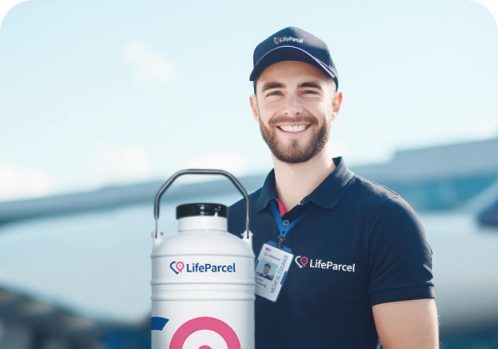If you’re planning to transport your fertility materials, you’re probably worrying: what could actually go wrong? While most IVF shipping goes smoothly, understanding potential IVF shipping problems helps you make informed decisions and choose the right transport approach.
Here’s an honest look at what can happen during fertility material transport—and practical steps to prevent these issues.
The most common IVF shipping problems
Understanding potential IVF shipping problems helps you plan better and choose transport providers who can prevent these issues. Based on industry data and real patient experiences, here are the main risks:
Temperature failures during transport
What happens: Container loses cooling capacity, temperature rises above safe levels, materials become non-viable.
Why it occurs:
- Dry shipper not properly charged before transport
- Equipment failure or insulation damage
- Extended delays beyond container capacity
- Improper handling or storage during transit
Prevention strategies:
- Verify container was charged within 24 hours of pickup
- Choose providers with real-time temperature monitoring
- Ensure backup protocols exist for extended delays
- Select containers with capacity well beyond expected transport time
Lost or misrouted shipments
What happens: Materials end up at wrong destination, get stuck in transit, or disappear completely in shipping system.
Why it occurs:
- Incorrect labeling or documentation
- Customs confusion about contents
- Airline routing errors during connections
- Communication breakdown between carriers
Prevention strategies:
- Use hand-carry services to maintain custody
- Require GPS tracking throughout journey
- Verify all labels and documentation before departure
- Choose providers with direct relationships to avoid handoffs
Customs delays and seizures
What happens: Materials held at border for inspection, documentation review, or regulatory compliance issues.
Why it occurs:
- Missing or incorrect import permits
- Incomplete medical documentation
- Customs agents unfamiliar with fertility materials
- Changes in regulations not reflected in paperwork
Prevention strategies:
- Research destination country requirements months in advance
- Work with providers experienced in international regulations
- Prepare multiple copies of all required documentation
- Use customs brokers familiar with medical specimens
Communication breakdowns
What happens: Clinics, patients, or transport providers lose contact, creating confusion about timing, requirements, or status.
Why it occurs:
- Multiple time zones complicate coordination
- Weekend/holiday communication gaps
- Unclear points of contact at clinics
- Language barriers in international transport
Prevention strategies:
- Establish clear communication protocols before transport
- Verify 24/7 contact availability from transport provider
- Create group communications including all parties
- Confirm backup contacts at both clinics
Documentation problems
What happens: Incomplete or incorrect paperwork causes delays, rejections, or legal complications.
Why it occurs:
- Country requirements change without notice
- Translation errors in international documents
- Medical certification expires during transport
- Clinic provides incomplete patient information
Prevention strategies:
- Start documentation process 4-6 weeks early
- Use professional translation services for international papers
- Verify document validity periods and renewal requirements
- Create comprehensive checklists for all required papers
Specific IVF shipping problems by transport type
Different transport methods face different IVF shipping problems. Here’s what to watch for:
Standard shipping services
Common problems:
- Multiple handoffs increase loss risk
- No specialized handling for medical materials
- Limited temperature monitoring capabilities
- Poor communication during delays
Not recommended due to high risk.
Self-transport
Challenges:
- Full responsibility for complex international documentation
- Need specialized expertise in customs procedures for medical materials
- No backup options if problems arise during transport
- Must handle equipment failures, delays, or emergencies alone
- Customs agents may question unfamiliar travelers carrying medical specimens
- Difficulty accessing emergency support in foreign countries
Consider if: You’re comfortable taking full responsibility for complex documentation, potential delays, and equipment failures with no professional backup support.
Hand-carry services
Downsides:
- Higher cost than standard shipping
Hand-carry services exist specifically because fertility material transport involves specialized requirements that most people don’t encounter in regular travel. Professional couriers maintain current knowledge of changing international regulations, carry backup equipment, and are skilled at professionally communicating with customs authorities to prevent delays or holdups. While the cost is higher, many families find this investment worthwhile to avoid the potential complications and much higher costs associated with transport problems, treatment delays, or material replacement.
Best for: Those who want peace of mind knowing their precious cargo is handled with the utmost expertise and contingency plans for any and all unexpected situations.

How to evaluate transport providers for IVF shipping problems
When researching transport options, ask specific questions about how they handle common IVF shipping problems:
About temperature control:
- “What’s your protocol if temperature alerts trigger during transport?”
- “How quickly can you respond to equipment failures?”
- “What backup systems exist for extended delays?”
About tracking and communication:
- “Can I access real-time location and temperature data?”
- “Who do I contact if problems arise on weekends?”
- “How do you handle communication across time zones?”
About documentation:
- “What countries do you regularly transport to?”
- “How do you stay current on changing regulations?”
- “What happens if customs requires additional documentation?”
About problem resolution:
- “Can you show me examples of how you’ve handled transport problems?”
- “What insurance coverage exists for temperature-related losses?”
- “Do you have relationships with customs brokers in destination countries?”
Red flags: signs a provider may create IVF shipping problems
Avoid transport providers who show these warning signs:
- Can’t provide specific examples of problem resolution
- Offer prices significantly below market rates
- Don’t have 24/7 support for international shipments
- Can’t show real temperature monitoring capabilities
- Refuse to provide references from recent clients
- Don’t understand destination country requirements
- Use multiple subcontractors instead of direct service
How LifeParcel prevents IVF shipping problems
At LifeParcel, we’ve built our entire service around preventing the IVF shipping problems that cause families stress and delay treatment cycles.
Temperature security: Our medical-grade dry shippers undergo pre-trip validation and include real-time temperature monitoring with 24/7 alerts. If temperature issues arise, our team responds immediately with emergency protocols.
Unbroken custody: Our hand-carry approach eliminates the handoffs that cause most lost shipment problems. Your materials stay with one trained courier from pickup to delivery.
Customs expertise: With experience across 32+ countries, we understand international regulations and maintain relationships with customs brokers worldwide. We handle all documentation and clearance processes.
Proactive communication: Our 24/7 support team keeps all parties informed throughout transport. You’ll have direct access to status updates and can contact us anytime with questions or concerns.
Proven track record: Our 100% success rate across 2,500+ missions reflects our comprehensive approach to preventing IVF shipping problems before they impact your treatment.
The reality about IVF shipping problems
IVF shipping problems are real, but they’re also largely preventable with proper planning and experienced providers. The key is working with professionals who have systems in place to handle the unexpected.
The investment in professional transport services often pays for itself by preventing the much higher costs of treatment delays, damaged materials, or starting cycles over.
Your fertility materials represent hope, investment, and dreams—they deserve transport that treats them with the care and expertise your future family requires.
Want to take the stress out of IVF transport? Request a quote or call us at +1-866-370-6577.





